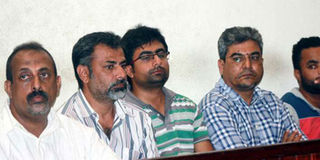Defence team in ivory case objects to use of recorded statement

Ivory trade suspects, from left, Feisal Mohamed Ali, Abdulmajeed Ibrahim, Praverz Noor Mohamed, Ghalib Sadiq Kara and Abdul Halim Sadiq in a Mombasa court on August 19, 2015 for the hearing of their case. The accused have been charged with being in possession of 314 pieces of ivory weighing 2,152 kilograms. PHOTO | LABAN WALLOGA | NATION MEDIA GROUP
What you need to know:
- Defence lawyer Moses Kurgat argued that it is not the business of the accused to provide statements to be used against them.
- Senior Principal Prosecuting Counsel Peter Kiprop said the defence only objected to the production of a document that has not been tested to see whether it is a statement of fact or a confession.
An attempt by a prosecution witness to produce statements by two people charged with being in possession of ivory worth Sh44 million was strongly opposed by defence lawyers.
Sergeant Jackson Guyo wanted to use the statements os Mr Abdul Halim Sadiq and Mr Ghalib Kara that were recorded by police.
The two have been charged alongside Mombasa businessman Feisal Mohamed Ali, Mr Praverz Noor Mohamed and Mr Abdulmajeed Ibrahim.
Defence lawyer Moses Kurgat argued that it is not the business of the accused to provide statements to be used against them.
Mr Kurgat further told the court that the statements were not admissible since they were taken by a police officer who was not qualified.
“It is unhealthy in the criminal justice system to allow police to record statements under the title of plain police statement. There is nothing as a plain police statement,” said Mr Kurgat.
He argued that to allow the prosecution to produce the statements is to prejudice his client to the extreme.
“The state is endowed with resources to carry [out] investigations, they do not have to rely on suspects,” said Mr Kurgat.
Another lawyer, Mr Gikandi Ngibuini, said the Mr Guyo's attempt to produce evidence discussed would violate the direct evidence rule.
Mr Gikandi further argued that if the evidence of the two accused was crucial to the prosecution, then they ought to withdraw charges against them.
“Evidence without the benefit of cross examination is like tea without tea leaves,” Mr Ngibuini told Principal Magistrate Diana Mochache.
DEFENCE VS PROSECUTION
Assistant Director of Public Prosecutions Alexander Muteti told the court that the statements of the two accused were taken by police before a decision was made to charge them.
Mr Muteti argued that in the course of a trial within a trial, the two accused can give evidence.
“Why can’t we hear the two in a trial within a trial, you do not know what you are being told to reject. You cannot reject what you have not seen,” said Mr Muteti.
Mr Muteti said the statements needed to be tested to know if they are confessions or not.
Senior Principal Prosecuting Counsel Peter Kiprop said the defence only objected to the production of a document that is not tested to see whether it is a statement of fact or a confession.
The witness, the investigation officer in the case, had told the court that he and a colleague took the statements of the accused.
Mr Guyo said the accused refused to make a statement under caution that it may be used as evidence in court.
“I recorded plain statements, I had not decided to make them (accused) witnesses or accused,” said Mr Guyo, adding that the accused recorded the statements voluntarily.
The accused have been charged with being in possession of 314 pieces of ivory weighing 2,152 kilograms.
The offence is alleged to have been committed on June 5, 2014 at the business premises of Fuji Motors East Africa Limited, on Tom Mboya Avenue, Tudor Estate in Mombasa.





